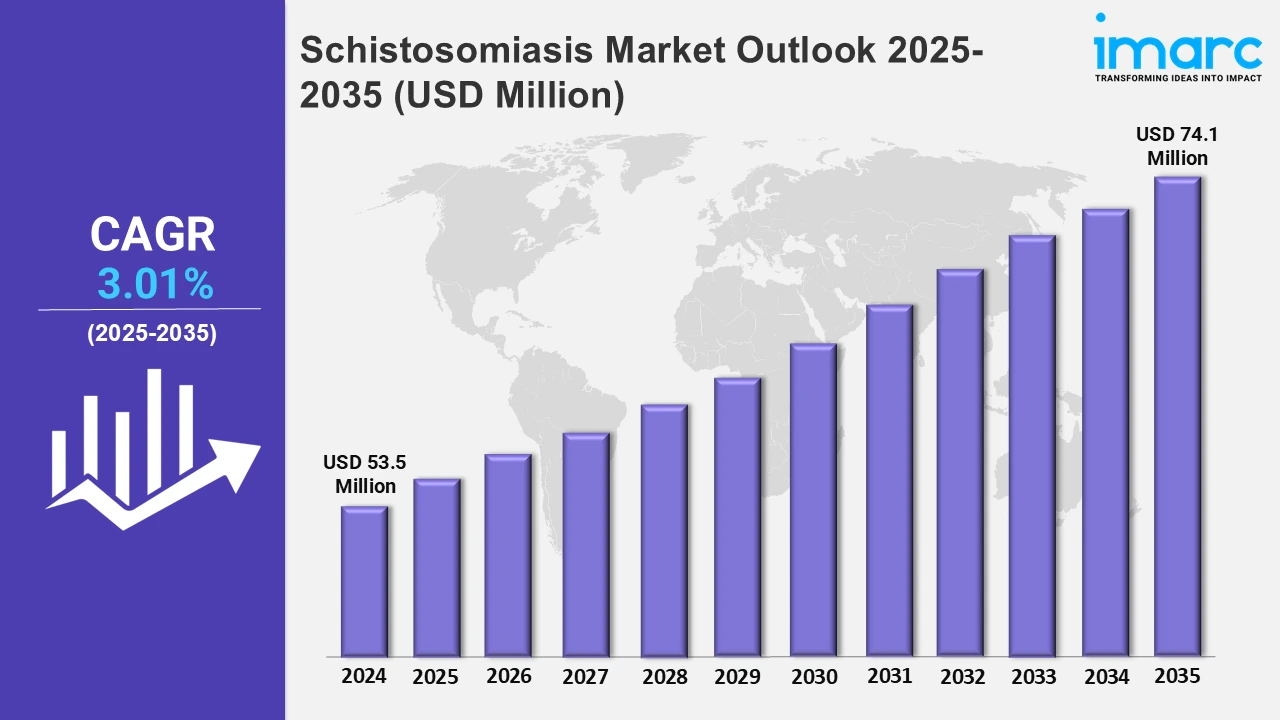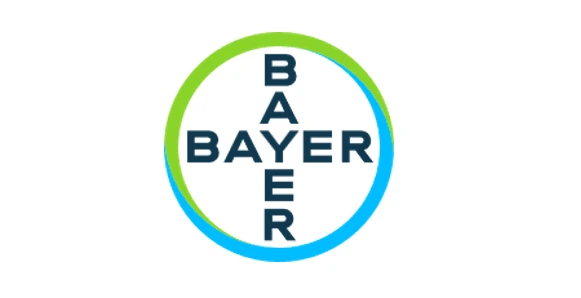Schistosomiasis Market Size to Reach USD 74.1 Million by 2035, Impelled by Advancements in Artemisinin-Based and Combination Therapies
Schistosomiasis Market Outlook 2025-2035:
The 7 major schistosomiasis market reached a value of USD 53.5 Million in 2024. Looking forward, IMARC Group expects the 7MM to reach USD 74.1 Million by 2035, exhibiting a growth rate (CAGR) of 3.01% during 2025-2035. Schistosomiasis Market Trend The rise in adoption of novel and advanced treatment options, such as oral antiparasitic therapies and non-invasive diagnostic techniques, that effectively manage the disease and reduce complications and recovery time assists drive the growth of the global Schistosomiasis market. Combination drug therapies and investigational vaccines for instance are emerging treatments that potentially target the parasitic life cycle, control inflammation, and prevent disease recurrences. These approaches ensure improved patient outcomes, increased convenience, and minimized side effects in comparison to conventional treatments. Such approaches are gaining acceptance because the reduction in the long-term intake of medication and hospital interventions enhances the effectiveness of treatment.

To get more information on this market, Request Sample
Advances in Early Detection and Diagnostic Technologies: Driving the Schistosomiasis Market
Modern diagnostic and treatment technologies in the Schistosomiasis market change the face of disease management as well as outcome for patients. The use of ultrasound and other imaging techniques such as optical coherence tomography to precisely visualize the organ damage associated with Schistosoma infection can help aid in accurate assessments and treatment plans. Molecular diagnostics, like PCR and NGS, have become increasingly significant tools for detecting Schistosoma DNA and analyzing parasitic load, making it possible to have tailored and early treatment strategies. The introduction of AI into diagnostics increases accuracy by automating the detection and classification of the stages of infection, supporting the rapid decision-making of healthcare providers. Non-invasive diagnostic tools, such as urine and antigen-based rapid tests, have gained popularity for their ease of use and reduced patient discomfort. Emerging treatment options, including advanced drug delivery systems and investigational antiparasitic therapies, offer solutions with minimized adverse effects and improved efficacy. New wearable health monitoring devices that monitor symptoms and adherence to treatment are now emerging, offering real-time data for disease management, especially in remote areas where healthcare access is limited. Telemedicine platforms have played a vital role in opening up care opportunities by providing distant consultation, diagnosis, and prescription for Schistosomiasis patients. This technology-driven approach ensures early intervention, improved patient monitoring, and better health outcomes, especially in endemic regions with limited healthcare infrastructure.
Development of Novel Therapies and Pharmacological Treatments: Contributing to Market Expansion
The Schistosomiasis market is increasingly expanding with innovative therapies and newer pharmacological drugs. New drugs are developed along with combination regimens that act on resistant populations of Schistosoma parasite strains to reverse the complications resulting from the diseases. The potential of biologicals is increasingly increasing, especially with the treatment of severe and chronic forms of the disease that tend to cause maximum inflammatory damage to the tissues and organs. Research focuses on monoclonal antibodies targeting pro-inflammatory cytokines, including interleukin-4 and interleukin-13, aimed at decreasing the inflammation and fibrosis in the tissues due to the disease. Drug delivery technologies, including liposomal formulations, nanocarriers, and sustained-release hydrogels, allow for controlled release at a specific site with higher concentrations achieved at the infected site, lowering systemic exposure, and therefore toxicities. The emerging adjunct treatments such as probiotics and immunomodulators are expected to help augment the immune system's response to the parasite as well as help prevent the recurrences of disease. Combination treatments that bring antiparasitics together with anti-inflammatory agents will be of prime importance in controlling the multi-angled pathology in Schistosomiasis. Non-invasive pharmaceutical interventions, including topical agents and formulations that disrupt biofilms, hold promise as ease of administration with a patient-centered approach contributes toward better disease management and better compliance with treatment programs.
Marketed Therapies in Schistosomiasis Market
Biltricide (praziquantel): Bayer HealthCare Pharmaceuticals
Biltricide (praziquantel) is the main antiparasitic medication utilized for treating Schistosomiasis. It functions by immobilizing and eliminating mature Schistosoma worms, enabling the immune system to remove them from the body.
Leading Companies in the Schistosomiasis Market:
The market research report by IMARC encompasses a comprehensive analysis of the competitive landscape in the market. Across the global Schistosomiasis market, several leading companies are at the forefront of developing integrated platforms to enhance the management of Schistosomiasis. Some of the major players include Bayer HealthCare Pharmaceuticals and others. These companies are driving innovation in the Schistosomiasis market through continuous research, diagnostic tools, and expanding their product offerings to meet the growing demand for Schistosomiasis.
Key Players in Schistosomiasis Market:
The key players in the Schistosomiasis market who are in different phases of developing different therapies are Bayer HealthCare Pharmaceuticals and Others.

Regional Analysis:
The key markets for Schistosomiasis include the United States, Germany, France, the United Kingdom, Italy, Spain, and Japan. As per IMARC estimates, the United States has the largest number of patients suffering from Schistosomiasis, and hence it is also the largest single market for its therapy. New therapies have recently cropped up for Schistosomiasis as well, with advanced antiparasitics, immunomodulators, and compounds capable of disrupting biofilms being some of the promising ones to better control the disease. Innovative candidates of therapeutics that overpass the traditional borders of treatment by targeting and hitting upon more than one pathway, involving parasite survival mechanisms, inflammatory responses, and tissue fibrosis, there is an improved outcome and decreased recurrence.
Recent advancements in diagnostic tools and methodologies have enabled earlier and more accurate detection of Schistosomiasis infection and disease severity. Molecular diagnostics, such as PCR and antigen-based tests, have revolutionized diagnostics, allowing for precise and timely treatment strategies with minimal adverse events. Other market drivers for Schistosomiasis are regulatory approvals, higher investment in R&D activities, and enhanced partnerships between pharmaceutical companies, providers of diagnostic technologies, and research centers. The use of AI-powered diagnostic devices and telemedicine solutions is enabling access to state-of-the-art care in far-flung and disadvantaged regions while opening up quality treatments and management programs for the diseases. Regions like North America and Europe are the leaders in innovation with advanced therapies and diagnostic solutions, driving the global Schistosomiasis market toward sustained growth and improved patient outcomes.
Key information covered in the report
- Base Year: 2024
- Historical Period: 2019-2024
- Market Forecast: 2025-2035
Countries Covered
- United States
- Germany
- France
- United Kingdom
- Italy
- Spain
- Japan
Analysis Covered Across Each Country
- Historical, current, and future epidemiology scenario
- Historical, current, and future performance of the Schistosomiasis market
- Historical, current, and future performance of various therapeutic categories in the market
- Sales of various drugs across the Schistosomiasis market
- Reimbursement scenario in the market
- In-market and pipeline drugs
Competitive Landscape:
This report offers a comprehensive analysis of current Schistosomiasis marketed drugs and late-stage pipeline drugs.
In-Market Drugs
- Drug Overview
- Mechanism of Action
- Regulatory Status
- Clinical Trial Results
- Drug Uptake and Market Performance
Late-Stage Pipeline Drugs
- Drug Overview
- Mechanism of Action
- Regulatory Status
- Clinical Trial Results
- Drug Uptake and Market Performance
About Us:
IMARC Group is a global management consulting firm that helps the world’s most ambitious changemakers to create a lasting impact. Across the six major continents and 100+ countries, we work alongside our business partners as one team with a common ambition to achieve unparallelled results, gain a competitive edge, and transform industries. IMARC Group excels in understanding its clients’ business priorities and delivering tailored solutions that drive meaningful outcomes. Our client base spans over 3,000 organizations in the private, public, and social sectors, ranging from high-growth startups to Fortune 500 companies.
Contact US:
IMARC Group
134 N 4th St. Brooklyn, NY 11249, USA
Email: Sales@imarcgroup.com
Tel No:(D) +91 120 433 0800
Phone Number: - +1 631 791 1145, +91-120-433-0800
Need more help?
- Speak to our experienced analysts for insights on the current market scenarios.
- Include additional segments and countries to customize the report as per your requirement.
- Gain an unparalleled competitive advantage in your domain by understanding how to utilize the report and positively impacting your operations and revenue.
- For further assistance, please connect with our analysts.

 Inquire Before Buying
Inquire Before Buying
 Speak to an Analyst
Speak to an Analyst
 Request Brochure
Request Brochure




.webp)




.webp)












